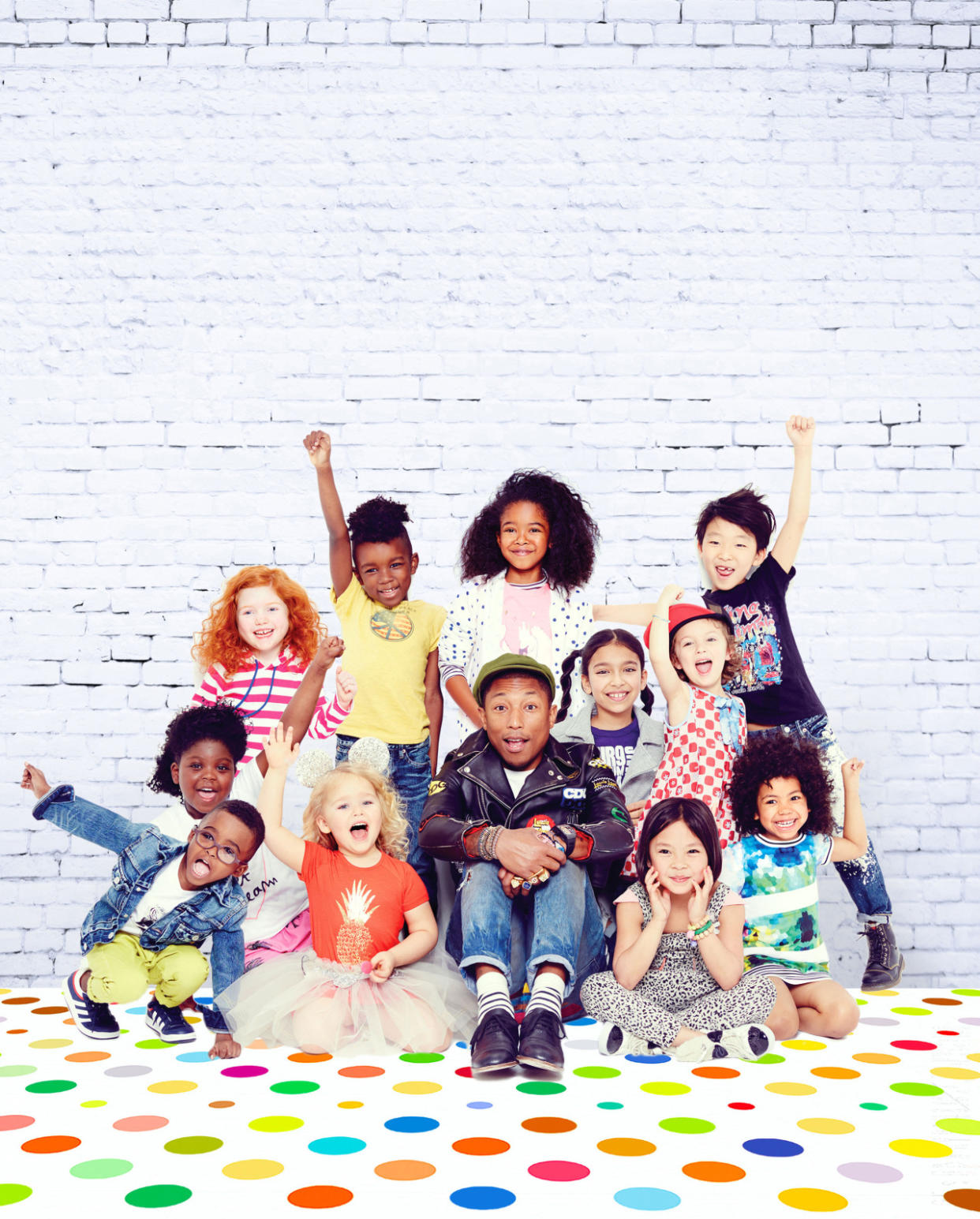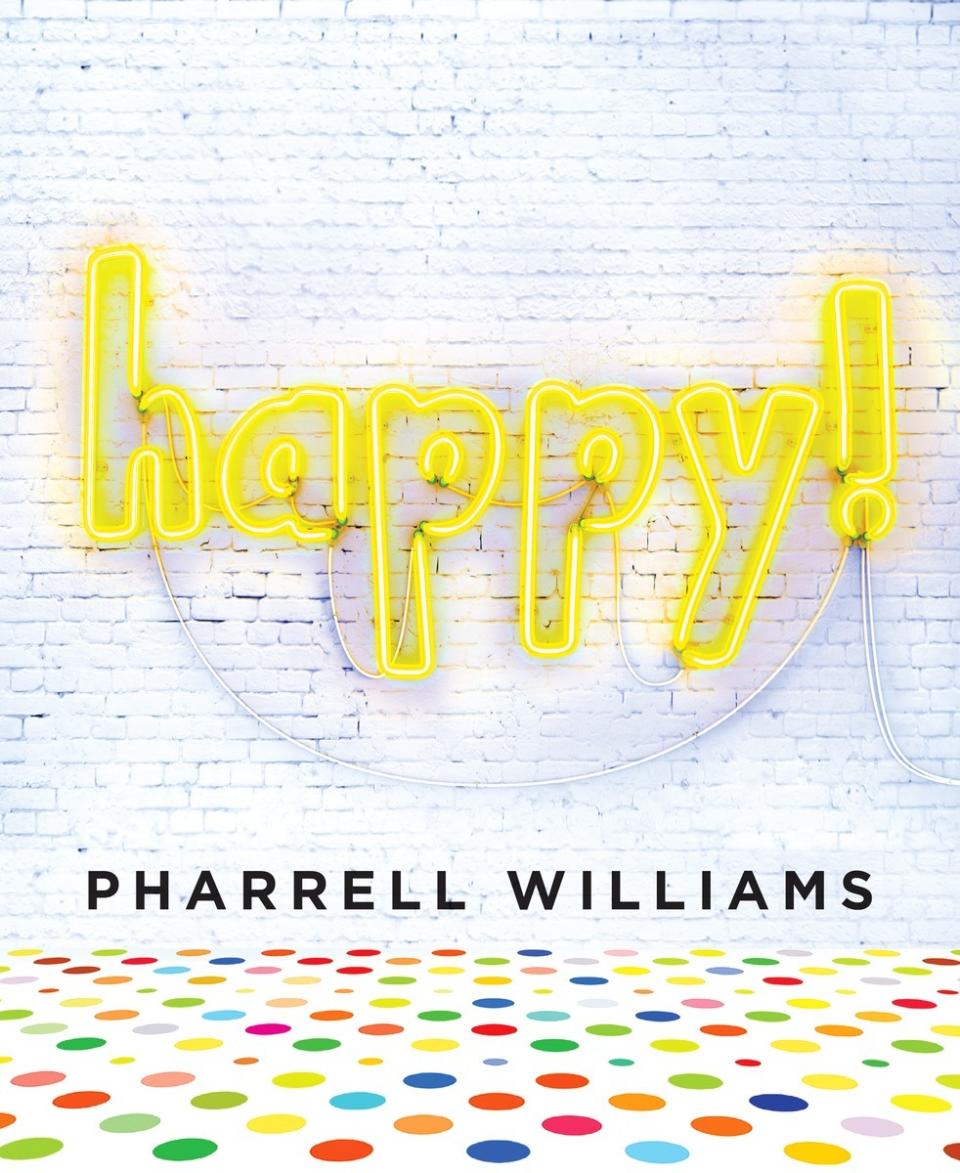Pharrell Talks His New Children’s Book, Fatherhood, and the Undeniable Phenomenon That Is ‘Happy’

Pharrell photographed with the children featured in Happy! (Penguin Random House)
When Pharrell Williams released “Happy” in November 2013, there was no way of knowing what a major success it would become. Written for the Despicable Me 2 soundtrack, the song went on to be the biggest hit in the career of a man who’s produced some of the biggest hits of other artists’ careers. The song can be seen in Despicable Me, it can be seen in the groundbreaking 24-hour music video he recorded to accompany it, and now it can be seen in the form of a children’s book, on shelves now.
Yahoo spoke with Pharrell at the Brooklyn Public Library, just minutes before he announced the #ReadHAPPY campaign, a partnership with First Book, which donates books to children without access.
How did this book come about in the first place?
The opportunity presented itself and it made the most sense to us because we felt like here was another platform for us to share the message. After seeing what the song became, which I literally had nothing to do with, I just did the song, but what the song became was just so much bigger than anything I ever dreamt of. Remember, it was for a film called Despicable Me 2, so when I saw the reaction, it was sort of like, OK, here’s a way that we can get this to them in a different iteration. The song was something that you heard, but this was something that you could feel, something more tactile and kinesthetic.

The front cover of Pharell’s Happy! (Penguin Random House)
We see a lot of artists, when they have kids, take on projects that are aimed at children — do you think fatherhood has changed you in any way as an artist?
I think being a father just changes you period.
Did you have your son [5-year-old Rocket] in mind when you were working on this book?
No, because my private life is just my private life. I always… it’s nice, it’s a great opportunity, you know, having a child, but usually, for whatever reason, I compartmentalize what I do for work and then home life.
You touched on this earlier, but the song was a phenomenon. Was that anything that you saw coming when you were recording it?
No.
What do you attribute its success to?
I have no idea, I was just as surprised. I’m still surprised, you know, it’s still charting like two years later.
If I had to guess — and I’m not an expert — I would think the message of the song was partially responsible…
That makes a lot of sense but if I would have gone into it thinking that, it probably wouldn’t have turned out the way that it did. Because my mind was more focused on, like, the objective which was to, you know, write a song that was perfect for the way that Gru [Steve Carell’s Despicable Me 2 character] was strolling down the street and the kind of glee that he was feeling, so my mind is still there. I didn’t mean this, I didn’t mean it to turn into all this, that was not my intention. It’s certainly awesome and it’s been awesome to experience, but its not something that I aimed for and I think had I aimed for it, I probably would have overshot it and it would have never been the song that it was. But because there was an objective and there was this great opportunity to work on Despicable Me, it just burst so much.
Is that how you approach songwriting and production, from the objective? Or do you have something you want to say that you start with?
I think my songs that have more of an objective genesis are the better songs. I think when I head out to do something intentionally I always feel like I overdo it. But then that’s me. I’m a producer, so I wrestle with what an artist is supposed to be in my own delusional way.
Have you figured that out?
No.

Each page of the book features lyrics from “Happy,” with children photographed acting them out (Penguin Random House)
This year, there wasn’t really a definitive song of the summer, is that something you noticed as well?
I feel like The Weeknd’s song [“Can’t Feel My Face”] was everywhere.
It just didn’t feel quite as inescapable as “Happy” or “Blurred Lines…”
The thing is that, as a producer, when I’m working with other artists, I can make those kind of judgement calls. With myself, I can’t make those judgement calls, nor can I tell you why something happens. It’s all very awkward and weird for me because… you don’t see producers have that kind of ride and especially since I wasn’t responsible for it, it’s not something that I can sit back and tell you, “OK, this is how this happened.” I mean, there are some logical reasons, right? But I think this was more than logic, it defied logic, so it was not something that I could necessarily control. It was people, it was where people were at that time, it was whatever was going on, it just made for all of the perfect conditions, ones that I cannot point out and tell you, “This one more than that one,” but I know that the conditions were just perfect for it and they were conditions that I was not responsible for. I wasn’t the summer, I wasn’t the mood, I wasn’t the environment, you know, so it wasn’t anything I could control, but I can tell you, as a producer, looking back and just thinking about that and just thinking about everything that it’s given me has been incredible, because this is something you don’t necessarily ask for but it’s just given to you, it’s one of the most amazing feelings ever.
This interview has been edited and condensed for clarity.

